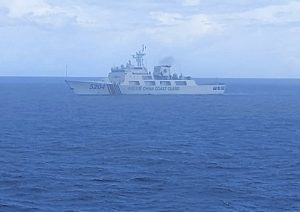China Demanded Halt to Indonesian Drilling Near Natuna Islands: Report
This undated photo released on Tuesday, September 15, 2020, by Indonesian Maritime Security Agency (BAKAMLA) shows a Chinese Cost Guard ship sailing in the North Natuna Sea.
One of those cited was Muhammad Farhan, an Indonesian lawmaker who sits on the parliament’s National Security Committee, who claimed that Chinese diplomats sent a letter to Indonesia during the crisis ordering it to halt drilling at a temporary offshore rig.
While Indonesia’s foreign ministry was tight-lipped on the issue, the report cited three other people who confirmed the existence of the letter. Two of them said China made repeated demands that Indonesia stop drilling in the area. Farhan told Reuters that Indonesia refused to comply. “Our reply was very firm, that we are not going to stop the drilling because it is our sovereign right,” he said, according to the report.
Farhan also alleged that Chinese diplomats also sent a separate letter protested against the holding of the Garuda Shield military exercises with the United States in August, which took place amid the standoff around the Natuna islands.
China and Indonesia have a recent history of friction around the Natunas, where Indonesia’s 200-nautical-mile Exclusive Economic Zone, a concept set out in the 1982 United Nations Convention on the Law of the Sea (UNCLOS), overlaps with the southernmost reaches of China’s expansive “nine-dash line” maritime claim.
The past five years have seen frequent incursions of Chinese fishing and maritime militia vessels into Indonesia’s EEZ. In response to the Chinese incursions, the Indonesian government has bolstered its military presence on Natuna Besar, the largest island in the area, and held military exercises in the surrounding waters. It has also beefed up armed maritime force, known as Bakamla, in order to deter foreign fishing vessels from entering its EEZ.
The standoff in question began in late June, when a semi-submersible rig, the Noble Clyde Boudreaux, arrived and begin drilling two appraisal wells in Indonesia’s Tuna block, located approximately 140 nautical miles north of Natuna Besar. China responded by sending a vessel to patrol close to the rig. Indonesia then promptly sent a Bakamla patrol ship, KN Pulau Dana, the first of a number of Bakamla and Indonesian navy ships that has tailed Chinese vessels around the area in the months since. (The Asia Maritime Security Initiative at Washington’s Center for Strategic and International Studies has a good rundown of the stand-off here.)
The demand revealed by Reuters marks the most forthright effort that Beijing has taken to defend its claims to sovereignty over the areas lying within Indonesia’s EEZ. Equally notable, at least on the account provided to Reuters, was Indonesia’s refusal to concede and its forthright defense of its sovereign rights under international law.
In recent years, Vietnam, Malaysia, and the Philippines have all come under Chinese pressure to end energy development projects operating in areas of the South China Sea claimed by Beijing, but this is the first time it has done so in the case of Indonesia.
The move suggests that the Chinese government is bent on pressing its sovereign claims in far-flung reaches of the South China Sea, even at risk of souring relations with Southeast Asian partners and outside powers, including the United States, which are concerned about its growing assertiveness.
It also reaffirms what many observers have long suspected about the ongoing but long-stalled negotiations between China and the Association of Southeast Asian Nations (ASEAN) over a Code of Conduct for the South China Sea, which could take steps forward under Cambodia’s upcoming chairmanship of ASEAN, is more a way of Beijing buying diplomatic time than a genuine attempt for it to resolve the disputes fairly. It also jars with President Xi Jinping’s comment at a China-ASEAN leaders summit last month that China “absolutely will not seek hegemony or even less, bully the small.”
Chinese policymakers may well judge that Indonesia is economically dependent enough on China that it can be worn down through incremental pressure tactics, and that it will acquiesce sooner or later to Beijing’s demands. Indonesia has generally trod carefully on its South China Sea tensions with China, refusing even formally to acknowledge the existence of a dispute, while asserting its clear sovereignty over its EEZ under UNCLOS. But more forthright and aggressive Chinese moves run the risk of at least pushing Jakarta to revisit its approach to the recent frictions.
To be sure, Indonesia now finds itself in a diplomatically sticky situation. China is Indonesia’s biggest trade partner and investment under the Belt and Road Initiative has been crucial to President Joko “Jokowi” Widodo’s domestic economic agenda. According to the Reuters report, the only reason that China’s demand to Indonesia was kept under wraps until now is that Indonesian leaders hoped to avoid unnecessary diplomatic friction with China. Its leaders wanted to be “as silent as possible because, if it was leaked to any media, it would create a diplomatic incident,” the parliamentarian Farhan was quoted as saying.
So far Jokowi’s administration has managed relatively to keep its flourishing economic ties with China fairly isolated from the periodic stand-offs and tensions offshore. How much longer it can sustain the balancing act in the face of intensifying Chinese pressure remains to be seen.

No comments:
Post a Comment
Comments always welcome!